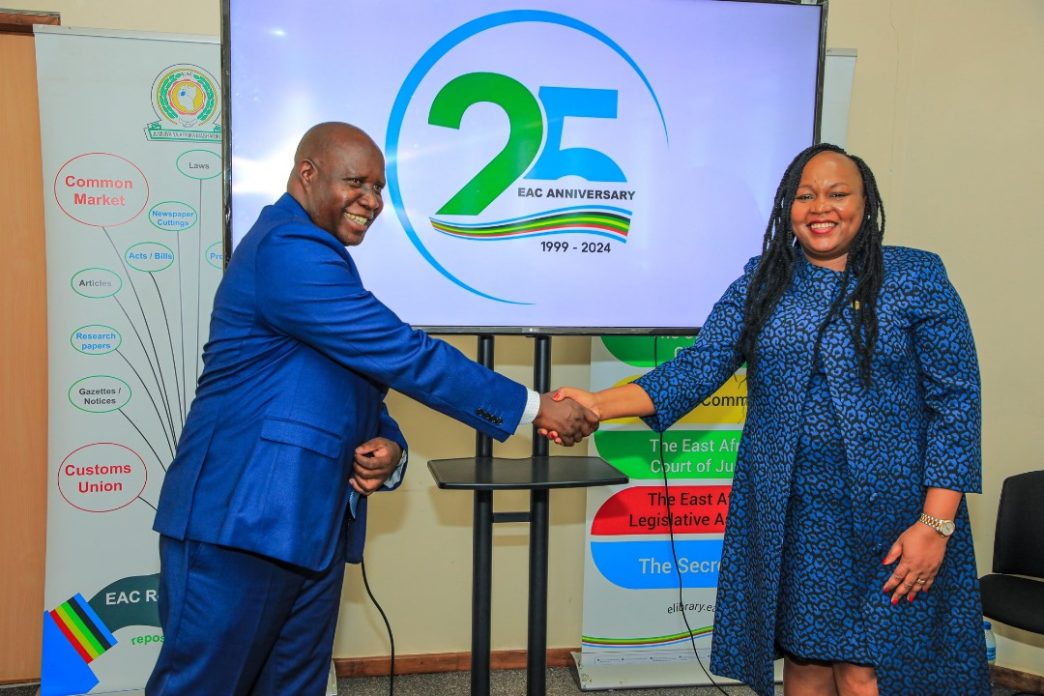
ARUSHA (Tanzania), Nov 4 (NNN-DAILYNEWS) — THE East African Community (EAC) is set to celebrate its 25th anniversary, marking substantial achievements in regional trade, customs integration and economic growth since its founding in 1999.
The milestone revelation was announced by the EAC Secretary General Veronica Nduva over the weekend in Arusha, during the launch of a commemorative emblem for the silver jubilee.
The EAC’s 25th anniversary will officially culminate on Nov 30 with the Summit of Heads of State holding their 24th Ordinary Summit. Celebrations will extend through June 30, 2025, featuring various activities across the region under the theme, “Promoting Trade, Sustainable Development, Peace and Security for Improved Livelihoods.”
Reflecting on the EAC’s progress, Nduva highlighted the transformation of the customs union into a Single Customs Territory with a common external tariff of 35 per cent, aimed at stimulating local industry growth and enhancing the region’s participation in global trade.
She noted that intra-regional trade has grown significantly, reaching 10.17 billion US dollars by September 2022. This increase is attributed to strong political support among member states, which has helped reduce non-tariff barriers hindering cross-border trade.
The EAC’s intra-regional trade, encompassing imports and exports among the seven partner states, grew from 13 per cent in 2019 (valued at 7.1 billion US dollars) to 15 per cent in 2021 (valued at 9.5 billion US dollars).
By September 2022, trade within the EAC reached 10.17 US billion dollars, representing a 20 per cent share of the region’s trade in global markets.
Since the 2010 launch of the EAC’s Common Market Protocol, the region has seen a boost in the free movement of people, goods, services and capital.
This progress has opened job opportunities, education access and business prospects for millions of East Africans, with the private sector emerging as a key driver of economic growth within the EAC.
Spanning from the Indian Ocean to the Atlantic, the expanded Common Market supports small businesses, investors and entrepreneurs across diverse industries, creating a more integrated regional economy.
In addition, the EAC has made significant strides toward establishing the East African Monetary Union (EAMU), with plans to introduce a single currency by 2031.
The recently established East African Monetary Institute is laying the groundwork for a regional central bank and three additional institutions are in development to further ensure the region’s monetary stability.
Infrastructure development has been central to the EAC’s progress, with member states investing in cross-border transport corridors, roads, railways and energy projects. The Northern Corridor (connecting Kenya, Uganda, Rwanda and the Democratic Republic of the Congo) and the Central Corridor (connecting Tanzania, Burundi, Rwanda and Uganda) have streamlined the movement of goods and people, reducing logistical costs, boosting trade and attracting foreign investment.
To support economic growth, the EAC has prioritised peace and security, implementing cooperative measures to counter terrorism, piracy and other cross-border threats. Enhanced intelligence-sharing, law enforcement and defence coordination among member states have contributed to stability and safety for EAC citizens.
The EAC has also advanced environmental conservation through cross-border initiatives addressing climate change, water resource management and biodiversity conservation. Programmes like the Lake Victoria Basin Commission support sustainable development by protecting ecosystems crucial for water, food and income for millions of East Africans.
Justice Nestor Kayobera, President of the East African Court of Justice (EACJ), highlighted the judiciary’s role in the EAC’s growth. As the EACJ nears its own 23rd anniversary this November, Justice Kayobera affirmed the court’s commitment to supporting the EAC’s continued success and integration. — NNN-DAILYNEWS






